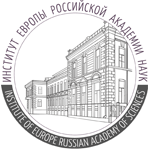Anna Ivanova

-
Education: Moscow State University (MSU)
-
Postgraduate: Institute of Europe (RAS)
-
Candidate dissertation: Foreign economic activity of companies in Germany: institutional mechanisms for business supporting
-
Position: Senior Research Fellow
-
Scientific activities:
Deputy Chairman of the Council of Young Scientists of the Institute of Europe
-
Scope of scientific interests: Germany`s economy, Germany`s foreign policy, international business, groups of interest, lobbying, Organizations of trade supporting, Neo-Institutional Economics
-
Major publications:
Ivanova A. K. Strategische Partner im Nahen Osten // Welttrends. N 172, 2021. S. 51-58 (In German)
Ivanova A. The Impact of the German Corporate Tradition on Formation of Foreign Economic Support System for Business// Mirovaya ekonomika i mezhdunarodnye otnosheniya, 2019, vol. 63, No 11, pp. 56-65. https://doi.org/10.20542/0131-2227-2019-63-11-56-65 .
(In Russian)
- Abstract: the German system of foreign economic activity support is traditionally divided into a number of components, including financial and functional measures (direct and indirect support, respectively). It is important to note, that indirect incentive mechanisms play a significant role in economic policy. In considering an export-supporting system, indirect support is no less important than direct government funding. The article analyses the formation of German institutions for business functional supporting. Special attention is paid to the concept of so-called “Three pillars of foreign economic support”. The author identifies a number of fundamental characteristics that could be the cause of the institutional evolution of business environment, and comes to a conclusion that the developed elements of corporatism, such as the institutionalization of interest groups and forms of their will as well as enhancing cooperation between private and public institutions, has played an important role in the future design of the whole system. This contributes to formation of various framework conditions in which economic players acquire greater resources allowing them to independently determine and reproduce the best practices in the field of international activity. The development and, accordingly, the complexity of business environment, as also wide communication capabilities, are the key to its resource base and potential for building an appropriate institutional system. The main principles of the foreign economic support system, formed under the influence of corporate tradition are also identified: 1) delegation of sovereign tasks to private economic agents; 2) the desire of the state to establish effective communication chains between all existing subjects of economic relations; 3) involvement of the largest possible number of stakeholders in the information exchange (in the process of elaboration, implementation and decision-making, in the exchange of economic information between private and public entities). So, policies that stimulate the corporate relations (or special interest groups) become a bridge between economic interests and state authorities, allowing the institutional system to determine the direction of its advancement.
Ivanova A. K. Prospects for German-Polish Economic Cooperation // Contemporary Europe. 2019. - № 7 (93). - С. 168-178. http://dx.doi.org/10.15211/soveurope72019168178
- The article analyzes current German-Polish economic relations. The author considers the prospects of economic partnership and highlights key investment projects which include: the European Battery Alliance, transit and energy issues. The author concludes that Germany is interested in intensifying economic relations with Poland and suggests that the growth of the geo-strategic importance of Poland as a transit country and industrial center in the medium term; in the short-term Poland potentially can enter the top-5 trading partners of Germany. In the future the innovative enterprises, primarily in the production of electric vehicles and components, will become a key element attracting FDI. German-Polish trade will continue to grow, increasing the country's chances to gain a foothold in Germany's first five trading partners in the next 5 years. The greatest contradictions affect the energy industry. On the one hand, Poland needs diversification of supplies, which could become a guarantee of energy supply, not vulnerable to sharp fluctuations in the global political situation. On the other hand, the economically manipulative actions of Poland in relation to the Russian supplier (a strategically important partner of Germany) impede German industrial development plans related to guaranteed supplies of Russian energy resources.
Ivanova A.K. The German Business in the USA: the Results of 2017 //Scientific and Analytical Herald of the Institute of Europe RAS. N2. 2018 C. 115-122. http://vestnikieran.instituteofeurope.ru/images/18_Иванова_АК_Немецкий_бизнес.pdf
- Abstract: German business is one of the largest investment and foreign trade partners of the United States. At the same time, in the first year of D. Trump's presidency, the US-Germany relationship was difficult at both the political and economic levels and required the efforts of each side to establish constructive dialogue with the EU. The leadership of the Federal Republic of Germany in 2017 repeatedly expressed concern over the violation of the WTO rules by the United States, the threat of dramatic changes in investment flows in Europe, the withdrawal of the United States from the Paris Treaty on climate, the extraterritorial nature of sanctions against third countries. But, as a result of the year, German subsidiaries do not see any reason to reduce investment
Ivanova A.K. Post-sanctioned economic recovery on the example of trade and economic relations between Germany and Iran // Current Problem of Europe [Актуальные проблемы Европы], Moscow: 2016 . N 1. С. 207 – 218 (In Russian)
https://upe-journal.ru/files/-2017-1_%D0%98%D0%B2%D0%B0%D0%BD%D0%BE%D0%B2%D0%B0%D0%90%D0%9A.pdf
- An economic pressure mechanism in global politics launched discussion on a new type of economy systems – post-sanctions economies. Iran, which is in process of the implementation of sanctions lifting, could be an illustrative example of returning and integration into global markets. This analyze allows to consider an effectiveness of the economic strategy and identify the obstacles it faces. The research is carried out in the context of German-Iran trade relations.
Ivanova A. K. Kooperation trotz Sanktionen // Welttrends. N 119, 2016. S. 45-50 (in German)
To other publication in Russian (https://www.instituteofeurope.ru/ie-ras/struktura/otdel-stranovykh-issledovanij/item/ivanova-anna-konstantinovna )
-
Membership in scientific associations: Gesellschaft "Russland - Deutschland" New Economic Association
-
Contacts:
+7 (495) 692-11-09
This email address is being protected from spambots. You need JavaScript enabled to view it.
